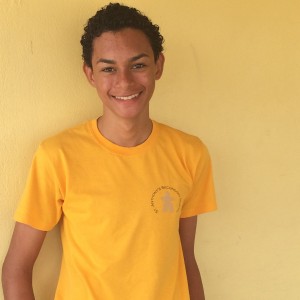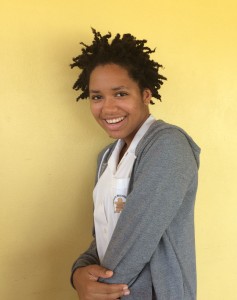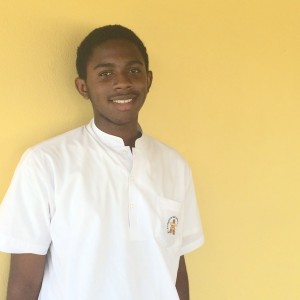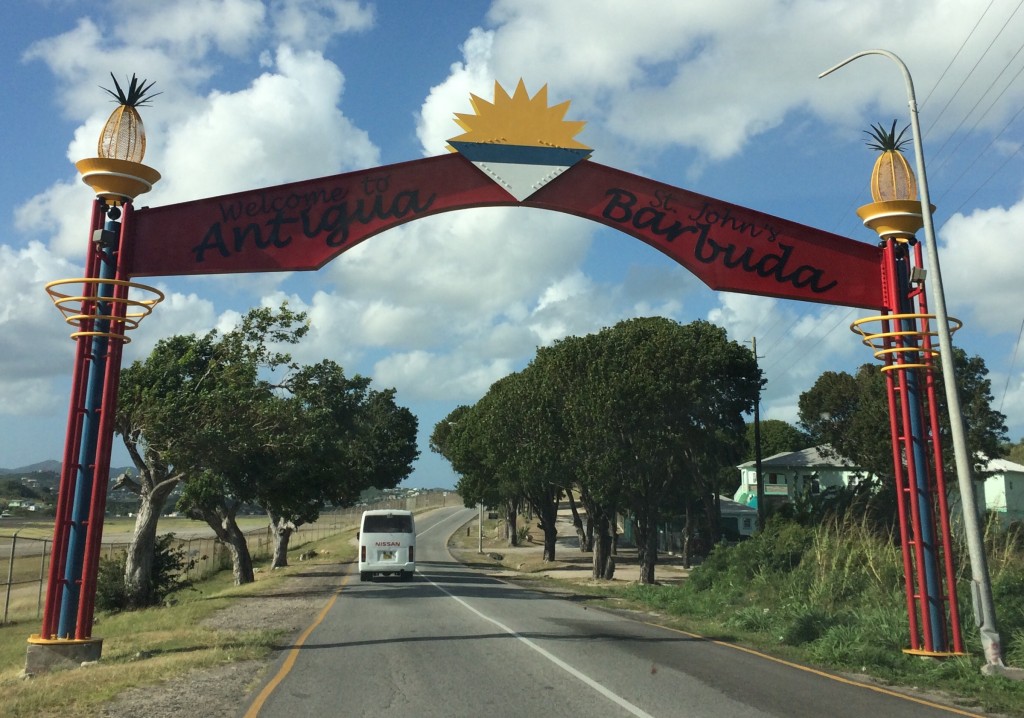On Jan. 5, my family and I began the New Year in a different country (Antigua and Barbuda). Though the move isn’t permanent, we began to adjust to the Antiguan lifestyle. From the different foods to the dialect, my family and I have learned and grown from this educational and cultural experience.
One of the biggest ways I’ve learned has been through the students at the school I attended. While completing my required classes for high school online via Georgia Virtual School, my siblings and I attended St. Anthony’s Secondary School (SASS). SASS is a nonprofit organization and the leading private high school in Antigua. The school is composed of forms (similar to grades) 1 through 5 (grades 7-11) with a special-needs program and an A Level program (postsecondary school). The school was co-founded by Joann Boulos-Callias in 2008.
Since attending the school, I’ve made many friends and memories. From the laughs to peers explaining to me their dialect, I’ve truly enjoyed my time with each and every one of them. I mainly associated myself with the 5th formers (the junior year of high school in the United States) and the A-Level students, and found that we all had similar tastes in multiple areas. From pop culture to sports, I was able to connect with them and learn some things along the way. Even though connections were made, I was able to see the differences in our lifestyles and particular tastes. Fortunately, I was able to capture the voices of three of my friends and their views on certain topics.
 Christopher P., 17, A-Levels (1st year)
Christopher P., 17, A-Levels (1st year)
Q: Any background information you wish to give us?
A: I can kind of sing. The big thing is that I am gay — that’s about it.
Q: Is there anything you’re into in pop culture? Hobbies? Music?
A: I’m in love with “RuPaul’s Drag Race.” I’m obsessed with it! My favorite band is The 1975, but I like artists like Erykah Badu, Janelle Monae. I have a thing for soulful music.
Q: Could you describe your everyday life on the island?
A: (laughs) It’s not as interesting as people [foreigners] may think. It’s not like “all beach, all day, every day.” For the most part [my life] is mostly just school, because I’m in A-Levels and I’m studying the business subjects. It’s a lot of work. I’ve been working on my SBAs [school based assessments], which are pains, but I’ve got to get it done.
Q: Are there any disadvantages and/or advantages to living on the islands?
A: The advantages are obviously the sun and the beaches, ’cause who doesn’t love that. I can’t really think of any disadvantages, besides the fact that me being gay in the Caribbean is a problem. It’s kind of hard [being a part of the LGBT community] in the Caribbean, because people don’t tolerate it. I’ve seen a video on the internet of a boy in Jamaica who got killed because he was gay and cross-dressing. They stoned him and beat him up. It was mortifying to see, barbaric, really.
Q: Can you describe your life as a student, and go into detail about the A-Level program, SBAs etc.?
A: A-Levels are preparing you for college, but there’s a heavy work-load. SBAs are like assignments, or it could be in the form of a test, on each module before you do your final so that you get extra points toward your final exam.
Personally, I like A-Levels. It’s nice, and [so are] my classmates; I really can’t complain. The workload is a little bit heavy, but I think I can bear with it. I definitely think that this is preparing me for college.
Q: Any goals or plans for the future?
A: I’d like to be an accountant, but really anything in business. That’s my forte.
Q: Do you see yourself in Antigua in 10 years? Why or why not?
A: Probably not. One, the whole me-being-gay thing. Two, more/ better job opportunities. I don’t see many jobs that I’d like to pursue.
Q: If there was one thing that you’d like to say to American teenagers, what would it be? Antiguan teenagers?
A: [To the American teens,] Appreciate your freedom! You all are so lucky that you don’t even understand. There are no malls here, no parks here. Honestly, appreciate the freedom you’ve been given, and don’t take it for granted.
[To the Antiguan teens,] you are also very blessed. We aren’t involved in any global drama, and we live more of a mellow life.
Zion Michael, 16, 5th former
Q: Any background information you wish to give us?
A: I am from South Africa, and I moved here when I was really little. I’ve grown up in Antigua for past 15 ½ years. I also love to travel. I’m really into photography and film. (laughs) I’m about to drop a mixtape … I might, probably not.
Q: Is there anything you’re into in pop culture? Hobbies? Music?
A: Well, I play golf. I’ve played lots of sports over my lifetime. I’m really into music, and right now, I’m really getting into Kendrick Lamar and many other artists. I mainly listen to underground music on SoundCloud and YouTube.
Q: Could you describe your everyday life on the island?
A: Well, when it’s school time, I usually come to school. I still do regular human things. During the summer, it’s mostly going to the beach and participating in mass. Other than Carnival, we don’t really have anything else big, except for fete; that’s a big thing here, we love to fete and dance. Fetes, or “fettin’” are big parties that are usually held at a certain place and organized by entertainment organizations (such as One World Entertainment). At fetes, the music ranges from dancehall to rap/hip-hop.
Q: Are there any disadvantages and/or advantages to living on the islands?
A: Definitely! When I went abroad, I realized that people are different. I know that in the islands, and I believe this, people are friendlier. I like that I can go to the beach, and that the water is blue instead of brown like I’ve seen when I’m abroad. I never knew that [water that isn’t blue] existed. I like that I can walk. I can walk in the States, but there aren’t a lot of restrictions [here]. If wanted to go somewhere, I could jump the fence — it’s true. I feel like Caribbean children get more leeway than American children. I mean, I’ve seen some people [in the States] put their kids on leashes, and I thought that was crazy! I’ve never seen that ever here. We can also drink a lot more freely, like most of us start at 16 … though it’s not legal, we still have easier access to alcohol. If we want to see a rated-R movie, we don’t have to sneak in or show ID; we just go. We can also movie jump easily.
We do have horrible roads, like, our roads are so bad. We don’t even have a highway, like only two cars can be on a road [at a time]. When it rains, there are ponds in the roads.
Also, I can’t get my license until I’m 18.
Q: Can you describe your life as a student, and go into detail about 5th form?
A: My classes are pretty basic. I know that our classes are really small, like in my French class we have eight to 10 people. SASS is a pretty small school, because we have about 250 people here. Some of our classes here are POA (Principle of Account, an accounting class), POB (Principle of Business — teaches you how business is conducted/works. I don’t take this class), PE, and the core classes (math, sciences, history, English). We also have Building Technology, Technical Drawing, art, music, economics etc. You can take agriculture, food and nutrition, and other classes at other schools if they aren’t available at school.
Q: Any goals or plans for the future?
A: After SASS, I might stick around [in Antigua], and do A-Levels. I might go to the States, and go to college there since I’ve taken the SAT, but I’ve never lived in the States — I’m a bit scared about that.
Q: Do you see yourself in Antigua in 10 years? Why or why not?
A: Definitely not! I’m gonna be out of Antigua. See what I want to do [in life] is much bigger than Antigua. Since I’m a South African [I feel obligated]; I need to give back to where I’m from. I kind of want to travel and find out about the world. But, overall, I want to make an environmental impact on the world. In the future, a lot of things are going to change, so I want to open a desalination plant off the coast of Africa. The money from this plant will go to those living in poverty — I may even do some work for the United Nations. In general, I want to clean up the ocean.
A lot of us want to leave Antigua, because Antigua is small and there aren’t a lot of opportunities for those in the sciences right now … even if STEM [science, technology, engineering and math] is being pushed in our nation. A lot of us want to leave Antigua because of our global view on the world and want to pursue higher-level education. Maybe one day, we’ll come back.
Q: If there was one thing that you’d like to say to American teenagers, what would it be? Antiguan teenagers?
A: [To the American teens,] we [Caribbean people] aren’t all from Jamaica! There are many, many different countries and islands in the Caribbean. We don’t live in trees, we aren’t in the jungle. We actually have roads and cities. We don’t all have the same accent. There’s a Jamaican, Antiguan, Trini accents. We all have different Carnivals. Also, don’t walk up to us saying a stereotypical phrase. Just don’t! We are all different in many ways. Also, just because a Caribbean person may not be black, it doesn’t mean they aren’t Caribbean. If you weren’t raised here, even if you were born here and left, then you aren’t Caribbean.
[To the Antiguan teens,] I’m done.
 Jerry Aska, 15, 5th former
Jerry Aska, 15, 5th former
Q: Any background information you wish to give us?
A: I was born and raised in Antigua. I get good grades, and I’ve been on the Principal’s List every year. I help out my classmates, and they call me “helpful.”
Q: Is there anything you’re into in pop culture? Hobbies? Music?
A: I watch cricket and football when West Indies or Antigua is playing. I listen to soca, that’s the Caribbean genre. My favorite artist of all time is Machel Montano, because he has really good songs. I’m not really into that much music, but I like the song Rude by Magic!
Q: Could you describe your everyday life on the island?
A: Well, I have school, which means I get up and go to school. I go to school from 8 til 5, and I don’t really do much in the day. I go home, do homework and play games, then go to sleep. Text friends, that’s pretty much it.
Q: Are there any disadvantages and/or advantages to living on the islands?
A: Disadvantages, well, there isn’t much to do other than going to the beach. Maybe go to the movies. Other than that, there isn’t much to do. Advantages are pretty small, but it’s not that hard to find people.
Q: Can you describe your life as a student and go into detail about 5th form?
A: Well, I do 11 subjects. Add math, English, three pure sciences (biology, chemistry, physics), Spanish, French, IT (Information Technology) and Caribbean history. Our teachers are all pretty good. We have to do SBAs, and I just finished mine. Most of the teachers help out with the SBAs, though, not all subjects have SBAs. The pure sciences had 18 labs [each]. We would do experiments in class, and do a write-up in our lab books. Then, at the end of the year, five books are sent up as samples for CXC (Caribbean Exam Council), which is the people who operate the exams here.
CXC is for the Caribbean [as a whole], but the exam is called CSEC for 5th formers. In grade 6, we do CEE, which is the Common Entrance Exam — I think they renamed it. The top 150 boys and girls get to go to the best government schools in Antigua, if they choose to. I was on that list, but I chose to come to SASS instead, which is a private school — so I didn’t get a scholarship. We post the top 100 students in the newspaper after the CEE has been completed.
Q: Any goals or plans for the future?
A: I really haven’t put that much thought into my future. I like math and science, so I’ll probably do something in engineering. I haven’t decided on a college or anything. After I finish 5th form, I’m going to do A-Levels at the state college (Antigua State College).
Q: Do you see yourself in Antigua in 10 years? Why or why not?
A: I grew up in Antigua, and I’m not used to living anywhere else, so I’ll probably stay here for the next 10 years. You never know what the future holds so…
Q: If there was one thing that you’d like to say to American teenagers, what would it be? Antiguan teenagers?
A: [To the American teens,] not really sure what to say…
[To the Antiguan teens,] Antigua isn’t that bad. I hear about lots of horrors (rapes, murders, etc.) in America. It’s pretty relaxed here.




